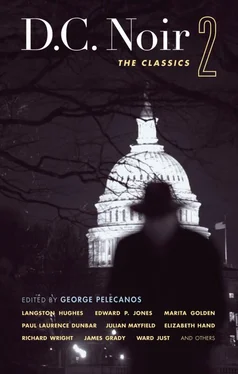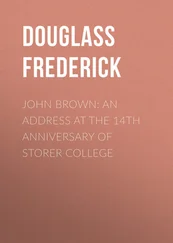He bought the groceries and took them home, then spent the rest of the day wandering from bar to bar. Not once did he think of fleeing. He would go home, sit, turn on the radio, then go out into the streets and walk. Finally he would end up at a bar, drinking. On one of his many trips into the house, he changed his clothes, rolled up his bloody shirt and trousers, put the blood-stained knife inside the bundle, and pushed it into a far corner of a closet. He got his gun and put it into his pocket, for he was nervously depressed.
But he still did not know what to do. Suddenly he recalled that some months ago he had bought a cheap car which was now in a garage for repairs. He went to the garage and persuaded the owner to take it back for twenty-five dollars; the thought that he could use the car for escape never came to his mind. During that afternoon and early evening he sat in bars and drank. What he felt now was no different from what he had felt all his life.
Toward eight o’clock that night he met two friends of his and invited them for a drink. He was quite drunk now. Before him on the table was a sandwich and a small glass of whisky. He leaned forward, listening sleepily to one of his friends tell a story about a girl, and then he heard:
“Aren’t you Saul Saunders?”
He looked up into the faces of two white shadows.
“Yes,” he admitted readily. “What do you want?”
“You’d better come along with us. We want to ask you some questions,” one of the shadows said.
“What’s this all about?” Saul asked.
They grabbed his shoulders and he stood up. Then he reached down and picked up the glass of whisky and drank it. He walked steadily out of the bar to a waiting auto, a policeman to each side of him, his mind a benign blank. It was not until they were about to put him into the car that something happened and whipped his numbed senses to an apprehension of danger. The policeman patted his waist tor arms; they found nothing because his gun was strapped to his chest. Yes, he ought to kill himself.. The thought leaped into his mind with such gladness that he shivered. It was the answer to everything. Why had he not thought of it before?
Slowly he took off his hat and held it over his chest to hide the movement of his left hand, then he reached inside of his shirt and pulled out the gun. One of the policemen pounced on him and snatched the gun.
“So, you’re trying to kill us too, hunh?” one asked.
“Naw. I was trying to kill myself,” he answered simply.
“Like hell you were!”
A fist came onto his jaw and he sank back limp.
Two hours later, at the police station, he told them everything, speaking in a low, listless voice without a trace of emotion, vividly describing every detail, yet feeling that it was utterly hopeless for him to try to make them understand how horrible it was for him to hear that woman screaming. His narrative sounded so brutal that the policemen’s faces were chalky.
Weeks later a voice droned in a court room and he sat staring dully.
“... The Grand Jurors of the United States of America, in and for the District of Columbia aforesaid, upon their oath, do present:
“That one Saul Saunders, on, to wit, the first day of March, 19—, and at and within the District of Columbia aforesaid, contriving and intending to kill one Maybelle Eva Houseman…”
“So that’s her name,” he said to himself in amazement.
“... Feloniously, wilfully, purposely, and of his deliberate and premeditated malice did strike, beat, and wound the said Maybelle Eva Houseman, in and upon the front of the head and in and upon the right side of the head of her, the said Maybelle Eva Houseman, two certain mortal wounds and fractures; and did fix and fasten about the neck and throat of her, the said Maybelle Eva Houseman, his hand or hands — hut whether it was one of his hands or both of his hands is to the Grand Jury aforesaid unknown — and that he, the said Saul Saunders, with his hand or hands as aforesaid fixed and fastened about the throat of her, did choke and strangle the said Maybelle Eva Houseman, of which said choking and strangling the said Maybelle Eva Houseman, on, to wit, the said first day of March, 19—, and at and within the said District of Columbia, did die.”
He longed for a drink, but that was impossible now. Then he took a deep breath and surrendered to the world of shadows about him, the world he had feared so long; and at once the tension went from him and he felt better than he had felt in a long time. He was amazed at how relaxed and peaceful it was when he stopped fighting the world of shadows.
“... By force and violence and against resistance and by putting in fear, did steal, take, and carry away, from and off the person and from the immediate, actual possession of one Maybelle Eva Houseman, then and there being, a certain finger ring, of the value of, to wit, ten dollars.”
He listened now with more attention but no anxiety:
“And in and while perpetrating robbery aforesaid did kill and murder the said Maybelle Eva Houseman; against the form of the statute in such case made and provided, and against the peace and government of the said United States of America.”
P.S. Thereupon Dr. Herman Stein was called as a witness and being first duly sworn testified as follows:
“... On examination of the genital organs there was no evidence of contusion, abrasion, or trauma, and the decedent’s hymen ring was intact. This decedent had not been criminally assaulted or attempted to be entered. It has been ascertained that the decedent’s age was 40.”
Part II
Burning down the house
The last days of Duncan Street
by Julian Mayfield
(Originally published in 1960)
Kingman Park
It was one of those bright days when that Washington sun wasn’t taking any stuff off of anybody. There wasn’t a cloud in the sky, and the wind wasn’t a big wind at all, just a little itty-bitty breeze to take the edge off the sun’s heat. It was a good day, man, because there wasn’t any school, the grown folks were at work, and we could do anything that crossed our natural minds. It was a crazy day, man, because that night Joe Louis was going to knock the living stew out of a big German named Max Schmeling.
We could have gone swimming. There was the colored pool on the other side of town and the muddy Eastern Branch of the Potomac was only a few blocks away. We could have swiped pop bottles from old man Farbenstein’s store yard and sold them back to him. Then we would have had enough money to ride across town to the picture show. A Bob Steele movie was playing at the Gem and a Tom Mix one was at the Alamo.
But this wasn’t the kind of day when you went swimming or sat in a movie. You could do stuff like that anytime. But how often did Joe Louis have a chance to get into the same ring with that blabber-mouth Schmeling. That German had been doing a lot of talking about how badly he was going to beat Joe. Naturally he thought he was better than Joe because he was white, but the newspapers were hinting that he thought he was better than everybody because he was a German. Well, you know Joe, he hadn’t said much, but all of us knew what was bound to happen. Joe was nobody’s talker, but he could dispose of a man before you could call his name. Yes, this was going to be a great night and we were prepared to celebrate it.
The bricks had come out of an empty lot in the middle of the block. They were red bricks that we had broken into halves, good bricks that were just right for throwing, bricks that you could aim at a white boy’s head. The baseball bats would come in handy for any close fighting. A white boy wouldn’t even know what had hit him if he got beaned with one of those Babe Ruth specials. We had a couple of knives and lots of milk bottles. It was going to be quite a night.
Читать дальше











